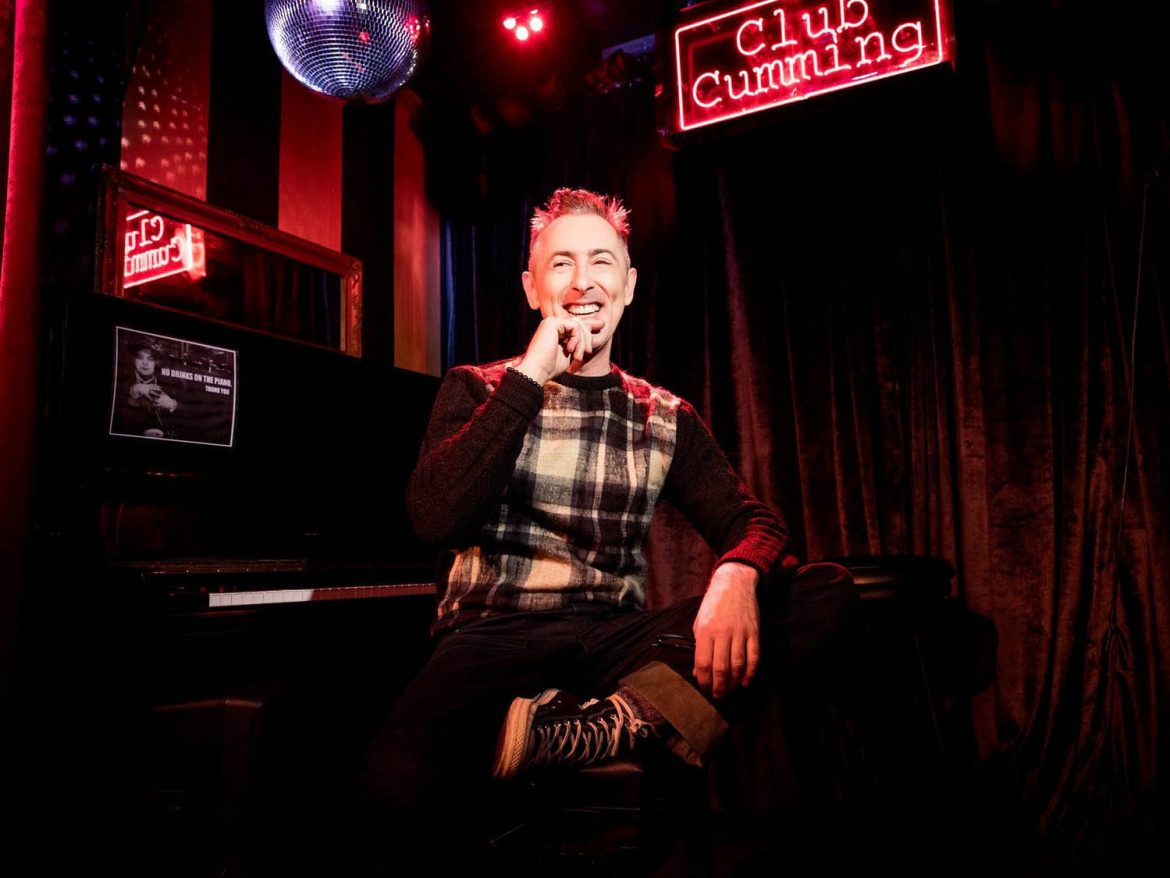To call Alan Cumming an actor would be like calling Picasso a painter, or Lady Gaga a singer. His prodigious talent and appetite for life enters another stratosphere in terms of output. At any given time Cumming can be acting in a network television series, starring in the lead role in a Beckett play on the London stage, doing a podcast interviewing gay icons, shooting a film, doing voices for animated movies and television, bartending, singing and performing at his own East Village club in New York, writing a memoir, performing his cabaret act, recording an album, and posting wild and intimate photos and political beliefs on his Instagram. And this is the shortlist, I left out many other things because I would run out of space. I recently interviewed Alan Cumming by email, and he replied with an audio file. It was wonderful to hear the replies in his delightful, sing-song, Scottish accent.
Listen to our interview with Alan Cumming here:
Where were you born and where did you grow up?
I was born in Aberfeldy in Perthshire in the Aberfeldy Cottage Hospital, but I grew up in Angus, which is the neighboring county in Scotland, near the little town of Carnoustie, where they do golf tournaments. My father was the head forester of a country estate, so I grew up in the middle of a forest, literally.
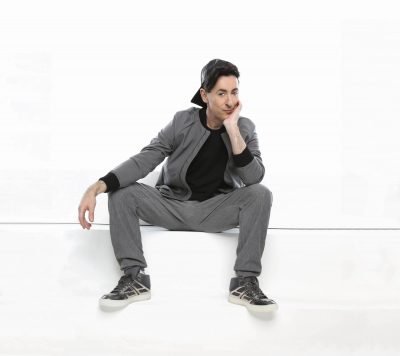
Alan Cumming in 2014 (Photo by Ezequiel De La Rosa)
At what age did you know or recognize you were an entertainer or performer?
I used to always play on my own and make up stories. I would wander around the forest and I kind of used acting or play-acting or used my imagination in a performative way from quite an early age. But it wasn’t till I was in high school, when I was about 13 or 14, when I really thought about it because I did a play at school and I recognized that I was actually kind of good at something and that was the first thing I was ever any good at.
Where did you train as an actor? Did any of your teachers or people in the industry have a big influence on you?
I trained at the Royal Scottish Academy of Music and Drama, now called the Royal Conservatoire of Scotland. Yes, a lot of my teachers had an influence on me. One had an influence on me in a very negative way. He told me in my second year that I would never make it as a professional actor. And I’ve since heard that at the same time, he told other people that he thought I was going to be a big star. I think that’s an example of bad teaching. A lot of people have influenced me in the industry, but I’m not one who looks at people as icons or mentors in that way. I think you’ve got to forge your own way. I take the good things from people and I see the bad things and try not to repeat them.
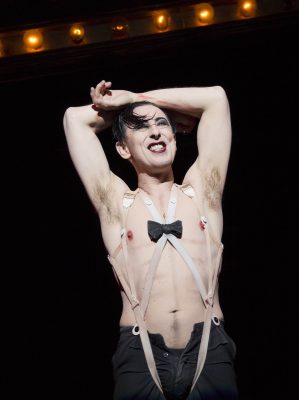
Alan Cumming in Roundabout Theatre’s Cabaret in 1998 (photo by Joan Marcus)
What was it like performing Cabaret on Broadway?
Cabaret on Broadway for me was completely overwhelming. I didn’t know what the fuck was going on. I had never worked in New York before or been in a play in America before. And suddenly I was the lead in a big, huge Broadway musical. It was overwhelming. I didn’t know all the sort of mores and tropes of Broadway, but it was an incredible experience. I really loved doing the role. I think it was a very good time in my life, I was comfortable with myself, my body, my sexuality. That really helped the role and the production and the kind of way that the whole show was placed in the zeitgeist at the time.
I’d done it four years before in London and it went very well. That’s why we did it on Broadway, but I don’t think I was as comfortable as I was when I did it in 1998. But in terms of the reaction and the whole sort of sensation of it, it was completely overwhelming.
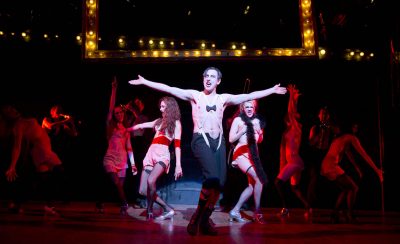
Alan Cumming in Roundabout Theatre’s Cabaret in 2014 (photo by Joan Marcus)
You reprised your role in Cabaret in 2014 back on Broadway and it was again directed by Sam Mendes. What was that like stepping into that character again sixteen years later and what were the differences between performing in it in 1998 and 2014, besides a different cast?
I kind of look back on it now and I’m so glad I did again in 2014 and 2015. It was directed by both Sam Mendes and Rob Marshall. I think that’s important to note that both of them directed. I was able to do the play and really enjoy it without being so confused by all the hoopla around it. And actually, I think what was good about doing it 16 years later is that all the sensational stuff like the sexuality and everything was less sensational and so it didn’t cloud the production in the way that I think it did in 1998. So actually, the darkness of the production and of the play were able to come through and that was the biggest difference. I’d been around the block a few times and I knew how Broadway worked. I knew I was comfortable in my life and I’m so glad I went back and did it again because I was able to enjoy and savor it more, plus I think the play was better.
The character of Eli in The Good Wife, an uptight, straight, Jewish campaign strategist, was a big departure in terms of other roles you had before. How did that role come to you? I believe this was your first major role on an American network television show. How did it affect you career? Did it bring you a new level of fame and recognition?
Eli Gold was just offered to me for one episode in early 2010 and I didn’t want to do it. I just thought, why are they asking me to do this? I didn’t understand it. When you have to be on television and they ask you to do an episode, it happens really quickly. And I was just like, well, what’s going on? Who are these people? I do understand what. But you know my managers and agents said, we really think you should do this, it’s a quality thing and who knows what could come of it. I heard a rumor that Nathan Lane had turned it down and then they gave it to me. Obvious choice. But I don’t know if that’s true.
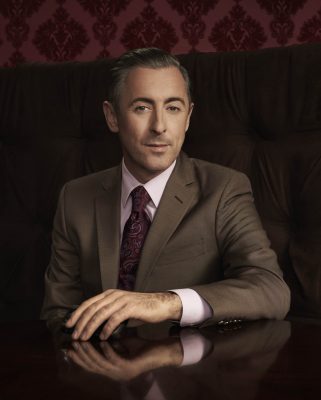
Alan Cumming as Eli Gold on the CBS series The Good Wife (Photo: Justin Stephens ©2012 CBS Broadcasting Inc. All Rights Reserved.)
It was an interesting thing for me because I thought, why are they asking me to do this? I’m not this person, but I know he’s a middle-aged man in a suit. Then I realized, well, I’m a middle-aged man so I’ll just put a suit on, and I’ll be able to do it. It was a big growing and learning curve for me in terms of as an actor and as a man realizing that I am now a grown up. It was my first recurring role on an American network show, and yes, it affected my career and it brought me a new level of human recognition
I was on television for seven years and was nominated for lots of awards and that kind of thing. When you’re on television for a long time, you’re really in people’s minds and you really stay in people’s mental periphery. I think with films and plays, they are things that are a one off and much more fleeting, but when you’re in people’s homes every week for many years, you are stuck with them. And that changes how my life, and how one’s life exists in the universe.
Another role that was a departure for you was the character of Sam in the 2017 film After Louie. You played an artist and AIDS activist who lived through the early years of HIV/AIDS who was sad, frustrated, and angry with your group of close activist friends having moved on from that time, as well as bewildered by the younger generation of gay men. Why did you take this role?
In terms of After Louie, the reason I took the role was I had never seen or read anything that was discussed, the treaties that there is in this schism between generations of gay men, I’d never seen anything about this. I thought about it and I experienced it, but I’ve never actually seen it in a book or a film or anything. And when I read this script, I thought, wow, this is sort of refreshing and fascinating because this is something that we all, especially gay people, understand, but we’ve never actually discussed it. So that’s why I did it. I thought it was so well-written.
I liked the idea of playing someone who was not charming and fun, or mischievous and devilish. He was kind of a dick, my character, and he was, not very nice and obviously had a lot of depression, PTSD and survivor guilt. He wasn’t the usual kind of person I play. Even when I play crazy people like Eli or other characters, they usually are sort of charming or, you want to charm people, people are drawn to you because they’re so mischievous. But with this character of Sam, I sort of purposely tried to be not likable. I thought that was important. I didn’t want to charm people, so that when they finally feel for him, it’s earned. So that was really exciting for me to play a character like that.
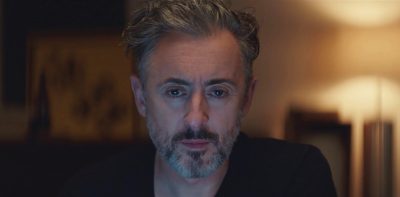
Alan Cumming in After Louie
What about the character of Sam resonated personally with you?
And in terms of personally, I wasn’t in New York during the AIDS crisis. I was aware of it and was very shaken by it, but I was in Scotland and I was young enough that I didn’t lose lots of my friends. But for a series of coincidences like where I grew up, that might not have been the case. It’s something that really resonates with me as a queer man and something that’s very much a part of my sort of collective memory and history of my community. So that’s why I just thought it was a really great script and I’m very glad I did it.
How did you meet your husband Grant and when did you know he was the one?
I met him in New York through a friend in 2000 and we were sort of acquaintances, friends for a couple of years and then we got together in 2004. And when did I know he was the one? In 2004 I had a housewarming/Fourth of July party at my new place in the Catskills, and he came and I just don’t know, it just happened. I just looked at him. He looked at me and that was it.
When and why did you become a U.S. citizen?
I became a U.S. citizen in 2008, so I could take part in the political process and vote. I wanted to vote for Barack Obama. I was very inspired by his message. [It didn’t happen until] too late, because the immigration process takes longer now since 9/11, so I actually became a citizen three days after Obama won. But still, I’m very glad it did. I think it’s important to put your money where your mouth is and to actually take part in the political process and to use your vote.
You own Club Cumming in the East Village in New York. How often do you go there and how often do you perform? Also, please tell us about the fun guests and friends who have come to the club.
I go there when I’m in New York, so it varies. I’m sometimes away for months but it’s like an extension of my life in New York. I just pop round and I love all the people who work and
I had just finished The Good Wife the year before and it wasn’t my intention to go back into network television, but, being asked to play the first ever leading character in a network drama who’s gay was a big deal for me. I also thought it’d be fun to do a cop show, which is essentially what it was and I was really glad that his sexuality was like the fourth or fifth thing about him that you would mention, and there are many other things that were more remarkable. I realized how often on network television in America, at least someone’s sexuality, if they’re not straight, is kind of always there. The main part of their storyline and their reason for being there, and it’s usually in a negative light. There’s something wrong with them; They’re sick or they’ve got a problem or they’re a serial killer, so it was just really nice to play a character who was queer and married and his sexuality was hardly mentioned. I did feel a sense of responsibility because I wanted it to be non-sensational and obviously non-judgmental. I think it did really well within the confines of essentially a cop show, to have a gay married couple in America in 2020, in Trump’s America. I think it was a really great achievement.
When and why did you become a vegan and an animal rights activist?
I became a vegan about 10 years ago and had been a vegetarian for a long time before that. I was just so fed up with every meal I got being drenched in cheese, that’s what happens when you’re a vegetarian. It was affecting my skin and my voice, so much dairy. I was starting to sing and to do concerts, I was a bit more paranoid about the mucus levels in my throat.
I was thinking about becoming a vegan for a variety of reasons: in terms of the environment, animal cruelty, and what it does to my body. I don’t like the idea of rotting flesh in my body and I never have, so now I just don’t do any of it. The straw that broke the camel’s back, made me turn full vegan was when I saw that Mike Tyson was the new face of Veganism magazine, and I thought if Mike Tyson could do it, I can do it.
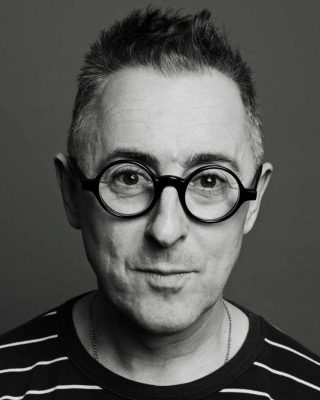
Alan Cumming (photo by Emil Cohen)
You have been a longtime LGBTQ activist in the U.S. and the UK. What issues do you think are important to the community now and what actions do you think they should take?
I think we’ve got to be vigilant. In most of the interviews I do about LGBTQ issues, people always say, “Isn’t it great? We’ve come so far.” And I say, yes, but we haven’t come far enough. We still don’t have equality. You know those places in America where you can still be fired for your sexuality or your gender orientation? You know, black trans women are being killed at an alarming rate; The life expectancy for a black trans woman in America is 35 and that’s not because they’re dying of diseases. That’s because people are killing them who hate them, so I feel there’s a long way to go. I think the most important thing is not to be complacent and to be vigilant about the little things that are happening: a ban here, a health care ban there. You know that this administration does not like people who are, in their view, different. And I am different, and I am worried about what could happen if Trump gets in again. So, yes, we can get married and yes, we can do things that we would that we might never have dreamed of, even a relatively short time ago. But we still don’t have equality and we still don’t have the respect that most straight people don’t even have to think about.
What are some of your upcoming projects?
I’ve got a new memoir I’m working on. I’ve been doing quite a lot of animated voice work in the lockdown. I’ve got a show I think that’s coming out in February on HBO Max called The Prince, an animated show and I’ve got my podcast I do with Chris Sweeney. It’s called Homosapiens. It’s an LGBTQ focused podcast and this season we’re doing interviews with people we think of as icons. And next season we’re going to be talking to people we think are trailblazers. And so that’s really interesting. I really love that. I’ve been enjoying becoming a podcaster.
_______________________________________


